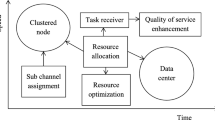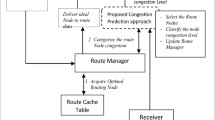Abstract
Mobile ad hoc networks typically use a common transmission power approach for the discovery of routes and the transmission of data packets. In this paper we present PCQoS; a power-controlled Quality of Service (QoS) scheme for wireless ad hoc networks which builds QoS mechanisms for specific applications that wish to tradeoff better QoS performance for sub-optimal paths. PCQoS allows selected flows to modify their transmit power as a way to add and remove relay nodes from their paths in order to coarsely modify their observed application QoS performance. We present simulation results and show that PCQoS can be used to provide coarse control over traditional QoS metrics (e.g., delay, throughput). To the best of our knowledge the PCQoS protocol represents the first attempt to use variable-range transmission control as a means to provide QoS differentiation to applications in wireless ad hoc networks.
Similar content being viewed by others
Explore related subjects
Discover the latest articles, news and stories from top researchers in related subjects.References
Ahn, G.-S., Campbell, A. T., Veres, A., & Sun, L.-H. (2000). SWAN: service differentiation in stateless wireless ad hoc networks. In Proceedings of IEEE Infocom, New York, NY.
Ali, I., Gupta, R., Bansal, S., Misra, A., Razdan, A., & Shorey, R. (2002). Energy efficiency and throughput for TCP traffic in multi-hop wireless networks. In Proceedings of Infocom, New York, NY.
Balakrishnan, H., Seshan, S., & Katz, R. (1995). Improving reliable transport and handoff performance in cellular wireless networks. ACM Wireless Networks 1(4).
Balakrishnan, H., Padmanabhan, V. N., & Katz, R. H. (1997). The effects of asymmetry on TCP performance. In Proceedings of ACM Mobicom, Budapest, Hungary.
Bhagwat, P., Bhattacharya, P., Krishna, A., & Tripathi, S. (1997). Enhancing throughput over wireless LANs using channel state dependent packet scheduling. In Proceedings of IEEE Infocom, Kobe, Japan.
Chen, Lei, & Heinzelman, W. B. (2005). QoS-aware routing based on bandwidth estimation for mobile ad hoc networks. IEEE Journal on Selected Areas in Communications, 23(3).
Clark, D., & Wroclawski, J. (1997). An approach to service allocation in the Internet. draft-clark-diff-svc-alloc-00.txt, work in progress.
Li, J. et al. (2002). Capacity of ad hoc wireless networks. In Proceedings of ACM Mobicom, Atlanta.
Gomez, J., & Campbell, A. T. (2004). A case for variable-range transmission power control in wireless multihop networks. In Proceedings of IEEE Infocom, Hong Kong, China.
Gomez-Castellanos, J., Campbell, A. T., Naghshineh, M., & Bisdikian, C. (2003). PARO: supporting transmission power control for routing in wireless ad hoc networks. Journal on Wireless Networks (WINET), 9(5), 443–460.
Gomez-Castellanos, J., & Campbell, A. T. (2003). Supporting application and channel dependent quality of service in wireless networks. Journal on Wireless Networks (WINET), 9(1), 21–35.
Goodman, D., & Mandayam, N. (1999). Power control for wireless data. In Proceedings of IEEE Momuc, San Diego, California.
Gupta, P., & Kumar, P. R. (2000). The capacity of wireless networks. IEEE Transaction on Information Theory, IT-46(2).
Haenggi, M. (2004). Twelve reasons not to route over many short hops. IEEE VTC 2004, Los Angeles.
Haenggi, M., & Puccinelli, D. (2005). Routing in adhoc networks: a case for long hops. IEEE Communications Magazine, 43, 93–101.
Holland, G., & Vaidya, N. H. (1999). Analysis of TCP performance over mobile ad hoc networks. In Proceedings of ACM Mobicom, Seattle, Washington.
Jeong, K., & Lim, H.: (2008). Experimental approach to adaptive carrier sensing in IEEE 802.15.4 Wireless Networks. Proceedings of ACM CoNEXT, Madrid.
Jia, X., & Li, D. (2004). QoS topology control in ad hoc wireless networks. In Proceedings of IEEE Infocom, Hong Kong, China.
Lee, S., & Campbell, A. (1998). INSIGNIA: in-band signaling support for QOS in mobile ad hoc networks. In Proceedings of IEEE Momuc, Berlin.
Liu, J.-S., & Lin, C.-H. R. (2005). An opportunistic relay method for increasing throughput in multirate IEEE 802.11 wireless LAN. IEICE Transactions on Communications, E88-B(6), 2672–2675.
Luo, H., Songwu, L., & Bharghavan, V. (2000). A new model for packet scheduling in multihop wireless networks. In Proceedings of ACM Mobicom, Boston MA.
Maniezzo, D., Bergamo, P., & Gerla, M. (2003). How to outperform IEEE 802.11: interference aware (IA) MAC. In Proceedings of MEdHocNet 2003, Mahdia, Tunisia.
Monks, J., Bharghavan, V., & Hwu, W. (2001). A power controlled multiple access protocol (PCMAP) for wireless packet networks. In Proceedings of Infocom, Anchorage, Alaska.
Narayanaswamy, S., Kawadia, V., Sreenivas, R. S., & Kumar, P. R. (2002). Theory, architecture, algorithm and implementation of the COMPOW protocol. In Proceedings of the European Wireless Conference, Florence, Italy.
Rashid-Farrokhi, F., Liu, K. J. R., & Tassiulas, L. (1996). Transmit bean forming and power control for cellular wireless systems. IEEE Journal on Selected Areas in Communications, 16(8).
Shih, K.-P., Chang, C.-Y., Chou, C.-M., & Chen, S.-M. (2005). A power saving MAC protocol by increasing spatial reuse for IEEE 802.11 ad hoc WLANs. In International Conference on Advanced Information Networking and Applications, Taipei, Taiwan.
Xu, S., & Saadawi, T. (2001). Does the IEEE 802.11 MAC protocol work well in multihop ad hoc networks. IEEE Communications Magazine, 39(6) 130–137.
Xue, F., & Kumar, P. R. (2006). Scaling laws for ad hoc wireless networks: an information theoretic approach. Foundations and Trends in Networking 1(2).
Zhu, J., Guo, X., Yang, L. L., Conner, W. S., Roy, S., & Hazra, M. M. (2004). Adapting physical carrier sensing to maximize spatial reuse in 802.11 mesh networks. Wireless Communications and Mobile Computing 4(8), 933–946.
Author information
Authors and Affiliations
Corresponding author
Rights and permissions
About this article
Cite this article
Gomez, J., Mendez, L.A., Rangel, V. et al. PCQoS: power controlled QoS tuning for wireless ad hoc networks. Telecommun Syst 47, 303–321 (2011). https://doi.org/10.1007/s11235-010-9320-4
Published:
Issue Date:
DOI: https://doi.org/10.1007/s11235-010-9320-4




